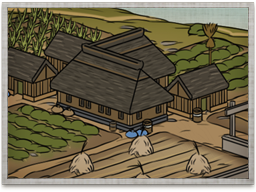Difference between revisions of "Land Consolidation (TWS2)"
m |
|||
| Line 5: | Line 5: | ||
|Enables=- | |Enables=- | ||
|Spawned Defence Forces=- | |Spawned Defence Forces=- | ||
| − | |Basic Building Statistics=<li>+950 to wealth from farms in this province</li> | + | |Basic Building Statistics=<li>Cost: 3900</li> |
| + | <li>+950 to wealth from farms in this province</li> | ||
<li>Provides food: 4</li> | <li>Provides food: 4</li> | ||
|Clan Effects=-}} | |Clan Effects=-}} | ||
Latest revision as of 03:15, 19 January 2013
| Land Consolidation (TWS2) | |
|---|---|
 | |
| Chain | Farming Type |
| Requires | Buildings: |
| Enables | - |
| Spawned Defence Forces | - |
| Basic Building Statistics | |
| Clan Effects | - |
| See main article; FotS Buildings | |
Description
When the bowl is bigger it holds more rice.
Land is the source of all wealth, and the ownership and control of land is vital to the success of any lord. By consolidating land holdings, more and more land is put into the ownership of fewer and fewer people. While this does deprive the peasantry of lands, it does enable proper investment in agriculture, making the land more profitable, just not equally profitable for everyone!
When the Tokugawa shogunate was established in 1603, a powerful centralized government once again existed in Japan. Most of the other, lesser daimyo were allowed to retain their lands, but were answerable for their good behaviour to the new shogun. A new era of peace allowed the daimyo to reorganise their own lands; villages that had become a little too independent were brought back under control. In this, Japan was not much different from other parts of the world, such as Europe, where peasants were having their commons confiscated by the gentry and nobility. The Tokugawa ruled until 1868, when the Meiji Restoration restored power to the Emperor and his court. The daimyos of 1868 were ordered to turn all their lands over to Emperor Komei, and Japan was formally reorganised into a series of prefectures.